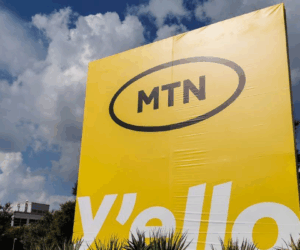MTN Nigeria has more than tripled its capital expenditure to ₦757.4 billion ($527.08 million) in 2025, signalling its biggest infrastructure investment in years as the country’s largest telecom operator races to meet surging demand for data and broadband services.
The figure, which rose from ₦217.6 billion ($151.43 million) in 2024, reflects the company’s accelerated push to modernise its network, expand fibre connectivity, and strengthen digital infrastructure across Nigeria.
“We accelerated investment in our network to improve quality of service in line with our commitment to customers and the government,” Chief Executive Officer Karl Toriola said. “With this progress, the Board has approved an interim dividend payment, reinforcing our commitment to delivering sustainable value to shareholders.”
A strong rebound in macro conditions
An improved macroeconomic environment supported the surge in spending. The naira appreciated from ₦1,535 per dollar in December 2024 to ₦1,475 by September 2025, while inflation eased from 34.8% to 18% over the same period. With foreign-exchange liquidity improving and the Central Bank of Nigeria cutting the Monetary Policy Rate to 27%, business sentiment and investor confidence rebounded.
MTN said these conditions helped it accelerate its capital programme, improve operating efficiency, and deliver its strongest financial results in years.
Where the money went
The company’s reports show that roughly 87% of the record capex was channelled into growth initiatives: network expansion, fibre rollout, spectrum renewal, and digital-service infrastructure.
A significant share — estimated at between $600 million and $650 million — went into network build-out and modernisation, including the addition of new mobile towers, fibre backhaul, and 4G/5G-ready sites.
In FY 2024, MTN had already spent about $152 million on licences and spectrum renewals, including ₦127 billion ($88.38 million) for its 3G licence in Nigeria, a regulatory investment crucial to maintaining compliance and ensuring future-ready networks.
The telco also ramped up spending on IT infrastructure, cybersecurity, and the first phase of its $240 million Dabengwa Tier-3 Data Centre, which launched in July 2025. The facility is central to MTN’s strategy to anchor data-intensive applications and cloud services within Nigeria, improving reliability and reducing latency for enterprise clients.
MTN’s broadband ambitions were also a major capex driver. It expanded fibre-to-the-home (FTTH) and fixed-wireless access (FWA) networks, targeting areas where demand and customer density make home broadband economically viable. The operator says this hybrid model — prioritising FWA for speed and scale while deepening FTTH where feasible — strengthens its leadership in home connectivity.
In Nigeria, MTN’s biggest market, capex in Q2 2025 stood at about ₦39 billion ($27.14 million), roughly 1.7% of group spend that quarter, focused on incremental infrastructure and spectrum upgrades.
Data explosion drives growth
The investment surge coincided with soaring data consumption. Data traffic grew 36.3% year-on-year, powered by the addition of 3.3 million new active data users in the first half of 2025, bringing total active data subscribers to 51.1 million.
Average data usage per subscriber jumped 26.3% to 13.2 GB monthly, fuelled by rising smartphone penetration, faster network speeds, and shifting consumer habits toward streaming, digital finance, and e-commerce.
MTN also adjusted data tariffs during the year, which encouraged higher-value package adoption and supported stronger revenue per user. “Demand for data remained robust, driving solid service revenue growth during the period,” the company said.
To manage network load and extend coverage, MTN entered a three-year spectrum lease agreement with T2 Mobile (formerly 9Mobile), covering 5 MHz in the 900 MHz band and 15 MHz in the 1800 MHz band. The partnership enables national roaming and infrastructure sharing, a move Toriola called “a crucial element in advancing digital inclusion across Nigeria.”
Broad-based recovery and profitability
The investments paid off in a sweeping financial turnaround. Service revenue climbed 57.5% year-on-year, with Q3 alone up nearly 63%. EBITDA more than doubled to ₦1.9 trillion ($1.32 billion), while profit after tax surged 245.7% to ₦750.2 billion ($522.07 million), representing a sharp reversal from the ₦514.9 billion ($358.32 million) loss a year earlier.
MTN restored positive retained earnings of ₦142.7 billion ($99.31 million) and shareholders’ equity of ₦293.1 billion ($203.97 million), reversing the deficits recorded at the end of 2024. Free cash flow rose 38.5% to ₦742.6 billion ($516.78 million), underpinned by disciplined spending and a stronger naira.
The company’s net-debt-to-EBITDA ratio improved to 0.1×, while interest coverage stood at 18.9×, clear signs of strengthened financial health. On the back of these results, the Board declared an interim dividend of ₦5.00 per share, payable to shareholders in November 2025.
Outlook: cautious optimism
As 2025 closes, MTN expects capex intensity to “moderate to within the high-teens range,” restoring stronger free cash flow. The company reaffirmed its medium-term guidance of at least 20% service-revenue growth and EBITDA margins between 53 and 55% from 2026 onwards.
“With a more stable macro environment and diversified revenue streams,” said Toriola, “we are well-positioned to sustain momentum, capture growth opportunities, and create enduring value for all stakeholders.”
Note: exchange rate used: ₦1,436.97/$








